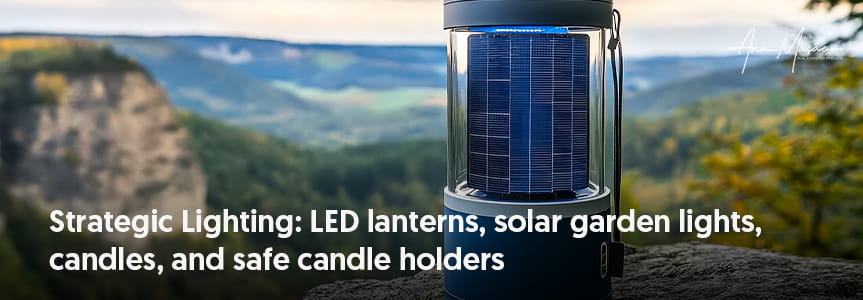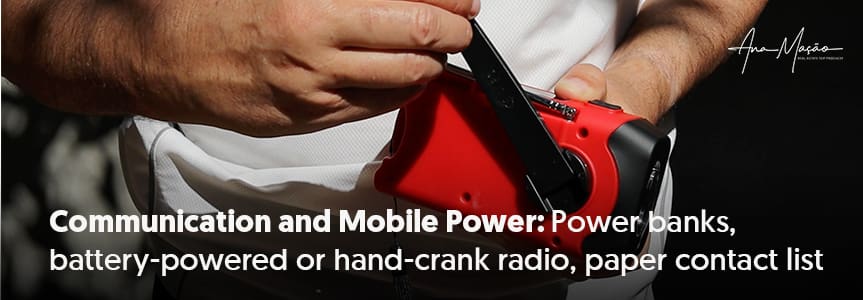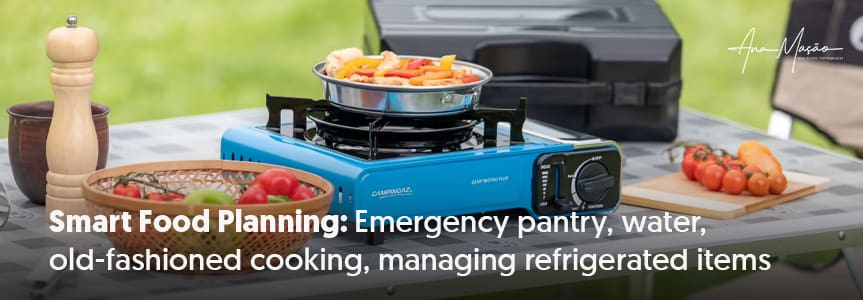Sweet Home... Even in the Dark? Given the recent large-scale blackout that affected Portugal and Spain, it is essential to prepare your home to face the consequences of a possible prolonged interruption of the electrical supply, in case an event of this nature occurs again, which experts believe may happen. Are you ready for the next one? Read my Practical Guide on how to deal with a Power Outage at Home and protect your family.
Hello to all followers of my Blog! In recent times, we have heard about an event that, although not daily, can turn our world (and our home!) upside down: a widespread blackout, like the one that recently affected several areas of Portugal (Madeira and Azores escaped the blackout) and Spain. More than just the scare or discomfort of being in the dark for a few hours, these events alert us to the huge dependence on electricity and the importance of being one step ahead.
What we "discovered" late was that, when the light fails, it's not just the TV that turns off. It's the refrigerator and freezer that start a countdown for the food to spoil, the mobile phone that runs out of battery when we need it most, the digital radio that doesn't work without electricity, the bathwater that goes from warm to cold, the garage gate that refuses to open, and in some cases, even the water may stop running. In the midst of chaos, having a plan and some resources prepared can make all the difference between facing a small setback and a big headache (or even a considerable loss).
So, instead of panicking when the switch doesn't work, how about calmly thinking about the subject and preparing our "home bunker"? This guide is not meant to be alarmist, but rather a source of advice with valuable tips and, who knows, even original ones, so that a blackout doesn't catch you off guard. And yes, some of these tips may even enhance and make your home more resilient or help in the purchase of your next property!
The Home Survival Kit: More than Candles and Matches
When it comes to preparing for blackouts, the first image that comes to mind is probably a drawer full of candles and a box of matches. It's a good start, but we can go much further! Think of a "home survival kit" adapted to the needs of your family:
Strategic Lighting:

- LED Lanterns: They are the queens of efficiency. There are several sizes - a powerful one for the whole house, smaller ones for each family member, and a headlamp to have hands free. Batteries, of course, and a stock of them! But there is another alternative: dynamo lanterns, where you just need to crank and voilà, light is made!
- Solar Garden Lights (Indoor Version): Did you know that those solar lights you have in the garden or on the balcony can be your best friends during a blackout? During the day, let them charge in the sun and, at night, spread them around the house. They are safe and do not use batteries.
- Safe Candles and Candleholders: Yes, candles still have their place, especially to create a cozier atmosphere. But beware: always use stable candleholders and never leave them burning unattended, especially near curtains or flammable materials. Don't forget the matches or lighter;
Communication and Mobile Energy:

- Fully charged Power Banks: The mobile phone is our connection to the world. Make sure you have one or two fully charged power banks with capacity for several charges. A Solar Powerbank can be an excellent long-term investment.
- Battery or Dynamo Radio: When the internet fails, an AM/FM radio can be crucial to get information from authorities. Dynamo (crank) or solar models are ideal because they do not depend on batteries. There are models that combine radio, flashlight, and mobile phone charging functions (battery, solar, and crank).
- Contact List on Paper: Seems like something from the Stone Age, doesn't it? But if your phone runs out of battery and you need to urgently call someone from another phone, you will be grateful to have important numbers written down and easily accessible. In fact, this is a good practice even without a blackout.
Smart (and Electricity-Free) Eating:

- Emergency Pantry: Keep a stock of non-perishable foods that do not require refrigeration or much cooking: canned or preserved (tuna, sausages, legumes, fruit), dry foods such as biscuits and energy bars, UHT milk, instant coffee, baby food jars (if applicable) and pet food, if you have any. The European Commission advises storing essential products to live for 72 hours. Check expiration dates regularly!
- Water, Lots of Water: It is recommended to store at least 3 liters of water per person, per day, enough for at least 3 days. Some countries recommend 6 liters per person. Bottled water jugs are the most practical option. For sanitary use, choose to store water in a container with a capacity of 30 to 50 liters, provided you have space to store it. In case of imminent water cut-off and if you do not have larger containers, you can always use the bathtub.
- Cooking the Old-Fashioned Way (Safely): If the power outage lasts, a small camping stove (gas or alcohol) can be useful for heating meals or water. Attention: Always use it in a ventilated area and away from flammable materials. If you have a charcoal or gas grill outside, it can be an alternative. Never, but never, use outdoor equipment indoors due to the risk of carbon monoxide poisoning.
- Managing the Refrigerator, Freezer, and Freezer Chest: Avoid opening the doors unnecessarily. A closed refrigerator keeps food cold for about 4 hours; a full freezer maintains the temperature for about 48 hours (or 24 hours if it is half full). A full freezer chest can keep frozen food for about 48 to 72 hours, depending on its insulation and capacity. Use a specific thermometer to check the temperature when electricity is restored - food that remains above 4°C for more than 2 hours may not be safe for consumption.
Comfort and Hygiene:

- Complete First Aid Kit: Check if everything is in order and if you have essential medications for all family members (especially if there are chronic illnesses). A first aid kit should include:
-
Essential materials:
- Plasters (various sizes);
- Sterile bandages (gauze);
- Elastic bandage (for sprains);
- Small scissors and tweezers;
- Disposable gloves (latex or nitrile);
- Saline solution (for cleaning wounds and eyes);
- Antiseptic (e.g.: Betadine®);
- Digital thermometer;
- Ointment for burns;
- Basic medications:
- Analgesics/antipyretics (paracetamol or ibuprofen);
- Antihistamine cream (for bites or mild allergies);
- Additional materials useful in emergencies:
- Thermal blanket (to prevent hypothermia);
- Instant cold compresses;
- Whistle to attract attention in case of emergency;
- If you need glasses, having spare ones is not a bad idea;
- Emergency contact list;
-
- Personal Hygiene: Wet wipes, hand sanitizer, garbage bags (for waste and, in emergencies, as an improvised toilet).
- Blankets and Warm Clothing: Even outside of winter, nights can cool down. Having extra blankets on hand is always good. In summer, a fan or water sprayer can help.
Cash:

ATMs and payment terminals may not work. Having some cash on hand for small expenses is a good precaution.
Being prepared for the worst is not a matter of pessimism or paranoia, it is just a matter of common sense.
Keep a list of items to take in case of evacuation, with all the personal items you should bring. In times of stress or panic, memory tends to fail.
Thinking Beyond the Blackout: Real Estate Investment
For those considering buying, building, or remodeling a home, a blackout can be a good time to reflect on some features that increase the resilience and comfort of the property:

Backup Power Systems:
- Generators: They can power the entire house or just the essential circuits. They require investment and maintenance, as well as outdoor space and care for noise and fumes. They are more commonly used in remote houses, but there are smaller solutions that you can use in your home.
- UPS (Uninterruptible Power Supply): Ideal for protecting sensitive electronic equipment (computers, security systems) and ensuring they continue to function for a limited period, allowing them to be safely shut down.
- Solar Panels with Batteries: An increasingly popular, sustainable, and safe solution. Solar systems with batteries allow you to store the energy produced during the day, so you can use it at night or during prolonged periods without electricity. In addition to energy autonomy, this option represents a clear advantage for your property. Attention: owning solar panels without batteries offers no advantage in case of a power outage, as they require grid power for the operation of the converter (inverter) that converts the direct current (DC) generated by the panels into alternating current (AC).
Non-Electrical Alternatives:
- Wood Burning Stoves or Fireplaces: If the house structure allows it, they can be an alternative and cozy heating source.
- Gas Water Heater: Provides hot water even without electricity (as long as there is gas supply). However, note: Some water heaters have electric ignition and do not work without electricity. Prefer models with manual or battery ignition for greater safety in case of a power outage.
- Insulation and Intelligent Design: A well-insulated house keeps the indoor temperature longer, whether in cold or hot weather, reducing the dependence on electrical climate systems. Efficient windows also make a big difference.
Home Security:
- Electric Gates: Make sure your electric gates have an easy-to-use manual opening system in case of power failure. If you live in an apartment with a communal garage, contact the condominium administrator in advance to ensure you have access to manual opening in emergency situations.
- Alarm System: If you have an alarm system, confirm in advance the duration of the backup battery and how the system reacts in prolonged power failure situations.
Water:
If you live in an area with a well or borehole, having a manual pump or a pumping system with backup can be an advantage.
The Family Plan: Who does what?

As important as having the right supplies is having a plan. Talk as a family:
- Assign tasks: Who is responsible for the flashlights? Who checks on elderly or vulnerable neighbors?
- Meeting point: If the blackout happens while you are separated, agree on a meeting point.
- Information: Decide on which radio or communication means to use to get official information.
- Children and Elderly: Pay attention to the specific needs of the young and old. Explain to children what is happening calmly so as not to scare them.
A Blackout Can Also Be an Opportunity
It may seem strange, but a blackout can have its "positive" side. Without television, internet, or the usual distractions, as happened in the recent blackout, it can be an ideal moment to:

- Bond as a family: Catch up, play board games by candlelight, play ball or other outdoor sports, etc.
- Read that book that has been on the shelf for months.
- Stargaze: If the blackout is long-lasting and in an area with little light pollution, the night sky can be a unique spectacle. Your children will love it.
Being prepared is not living in fear, but rather with the peace of mind of knowing that, in the face of an unforeseen event, you have the tools and knowledge to take care of yourself and your family. A small investment of time and resources now can save you many troubles in the future, especially since there are several warnings suggesting that this may not be a singular event.



